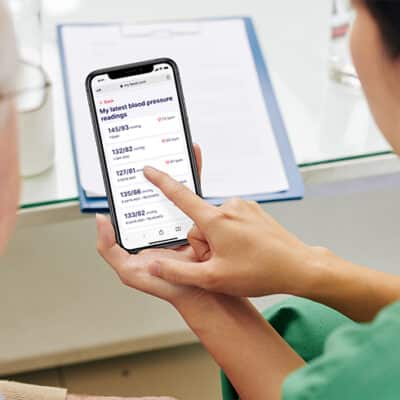Artificial intelligence (AI) is a revolutionary addition to healthcare and remote patient monitoring (RPM). AI medical assistance, when implemented in RPM programs, creates easy access to support and education for older adults. AI technology is not only a great resource for patients, but can alleviate stress for understaffed and overworked practices. There are a few major ways that AI is able to help senior patients as it is woven into the healthcare industry and RPM programs.
What is AI-enabled remote patient monitoring?
Some RPM companies have transformed their AI programs into realistic assistants to help patients use their software with comfort and ease. 100Plus’ Esper, an AI virtual health assistant, acts as an additional staff member that can attend to any and all patients at any time of day. As a virtual additional medical staff member, AI is especially crucial for currently understaffed practices. It has been provenOpens a new window that pairing in-home monitoring with smart technologies, or AI, for elderly patients increases independence, expands the health services available to them, and improves future outcomes.
With the expansion of RPM with the addition of AI, the understanding of options for patients has also expanded. AI not only helps individuals with their treatment plans, but helps clinicians execute those plans more effectively.Opens a new window RPM offers constant and continuous monitoring of patients, but AI takes this monitoring a step further to offer 24/7 support and communication. This communication facilitates early diagnosis and emergency prevention. The crossover between healthcare and AI technologies has led to increased independence in elderly patients, preventative health measures, and better health outcomes.
Patient onboarding
When patients are enrolled in an RPM program, specialized AI assistants are able to perform patient outreach and onboarding. This onboarding includes patient education and support and accelerates patient scaling and acceptance of the RPM program. Patients being onboarded will receive messages concerning their paperwork, the shipment of their devices, and how to set up their devices. With 24/7 support, patients can contact the AI assistant with any questions or issues they have at any time. Patient education may consist of manuals and helpful guides that can be requested at any point as well as direct connection to a support team.
Patient scheduling
The most comprehensive AI program will save practices lost time by performing menial tasks such as scheduling patients and sending out daily reminders. Clinicians can use this time to focus on providing the best and most efficient care. The best AI assistants will send properly timed messages reminding their patients to take their readings and encouraging them to adhere to best practices. AI assistants make scheduling virtual and in person visits easy by providing an accessible platform to book their appointments through without the hassle of a phone call. When adherence and scheduling are taken care of by AI, providers can take care of what is most important: the patients.
Adherence reminders
After patients are enrolled in their RPM programs, some AI assistants will send text messages that are triggered when patients fall out of their daily measurement routines. If patients fail to take a reading for a certain amount of time, they are sent an automated message. Patients who are reminded of this adherence take more than 35% more readings than patients who do not receive automated messages. Increased data collection enables practitioners to personalize and alter management and treatment plans for their patients.
Answer frequently asked questions
Beyond scheduling and encouraging patients to adhere to their routines, AI RPM programs can also answer the frequently asked questions many physicians are often tasked with by providing relevant and useful information to patients.



